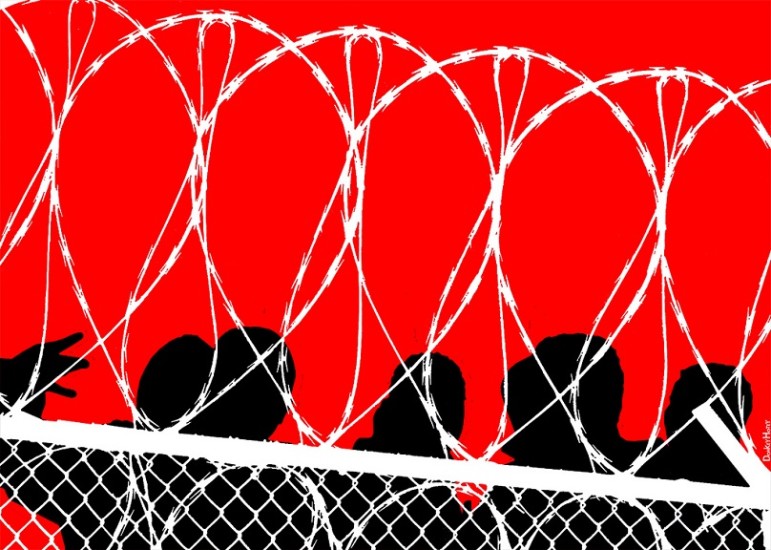
April 13, 2016; Mic.com
While Bill Clinton may still publically be supporting his massive 1994 federal crime bill, many local, state, and federal prisons continue to struggle under the weight of mass incarceration, the impact of which the bill exponentially expanded. Continuing in its effort to counteract mass incarceration, the MacArthur Foundation has announced for the second year initiatives helping localities reduce their jail populations while also addressing the racial and ethnic disparities apparent in our local jails. According to the foundation, these grants are “part of the first-ever coordinated, data-driven effort to reform the use of jails.”
“The way we misuse and over-use jails in this country takes an enormous toll on our social fabric and undermines the credibility of government action, with particularly dire consequences for communities of color,” said MacArthur President Julia Stasch in a press release. “The thoughtful plans and demonstrable political will give us confidence that these jurisdictions will show that change is possible in even the most intractable justice-related challenges in cities, counties, and states across the country.”
Totaling over $25 million, 11 jurisdictions will receive grants between $1.5 million and $3.5 million toward new reform efforts over two years while another nine districts will receive $150,000 each to continue local programs and projects currently in place. The grant initiative for the 20 districts is part of the foundation’s Safety and Justice Challenge, a $75 million national outgrowth and investment similarly focused on addressing mass incarceration and shifting the public view on the use of jails.
Districts to receive from $1.5 million to $3.5 million in grants:
- Charleston County, SC (includes North Charleston)
- Harris County, TX (Houston)
- Lucas County, OH (Toledo)
- Milwaukee County, WI
- New Orleans, LA
- New York City, NY
- Philadelphia, PA
- Pima County, AZ (Tucson)
- St. Louis County, MO (includes Ferguson)
- Spokane County, WA
- State of Connecticut
Districts receiving $150,000 in grants, all of which are previous 2015 recipients:
Sign up for our free newsletters
Subscribe to NPQ's newsletters to have our top stories delivered directly to your inbox.
By signing up, you agree to our privacy policy and terms of use, and to receive messages from NPQ and our partners.
- Ada County, ID
- Cook County, IL
- Los Angeles County, CA
- Mecklenburg County, NC
- Mesa County, CO
- Multnomah County, OR
- Palm Beach County, FL
- Pennington County, SD
- Shelby County, TN
According to the press release from the foundation, the districts were strategically chosen to be reflective of other communities, including larger cities as well as smaller and mid-sized localities. The hope is that with reform, these districts might also serve as models for other communities.
Through a rigorous selection process, each of the chosen districts was required to submit a data-supported plan for the specific factors driving incarceration in their locality and how they would utilize the grants to reform their local jails. The plans also addressed universal issues plaguing federal, state, and local systems, including mental health and substance abuse concerns, ineffective pretrial procedures, and high bail amounts, with realistic solutions.
For example, Charleston, South Carolina is planning on using part of its grant to open a triage center to divert incoming inmates with mental illnesses from prison. Lucas County, Ohio will launch a series of pre-arrest programs to educate law enforcement on implicit bias and de-escalation procedures to help provide alternatives to arrests and jail. Likewise, efforts in St. Louis County, Missouri will focus on what it believes to be the two main drivers of jail incarceration: pretrial detention and probation violations. In part, they hopes to drive down over-incarceration by expanding the offenses for which one can be eligible for pretrial release. Not only would more defendants be released awaiting trial or further updates on their case, but the county would also provide a variety of support services to ensure the safety of the defendant and the community.
Last year, the foundation chose 20 districts to receive at least $150,000, but noted ten of them would also receive between $500,000 to $2 million annually to continue their work. Many of the localities chosen for these initiatives have documented criminal reform issues that illustrate the need for, and possible impact of the funding. As we noted in our coverage of the annual report on wrongful convictions, Harris County continues to lead in the number of overturned wrongful convictions for drug possession. Moreover, as NPQ has been covering, Louisiana, including New Orleans, struggles with a lack of funding for its public defenders’ offices.
On the other hand, we also know that some of the districts included, like Cook County, Illinois, have already made significant strides in reforming their jails. Last May, officials asked a clinical psychologist to take over as warden of Cook County Jail, which houses around 10,000 inmates. While this hire doesn’t seem to be part of the foundation’s grants last year, it does illustrate the steps local communities are taking on their own to address criminal reform issues. The MacArthur grants can complement these efforts while freeing public funds to address other issues.—Shafaq Hasan












